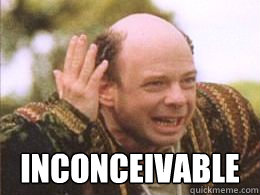I understand.
Personal spirituality is not the same as 'religion,'
I do agree with you there.
Welcome to Religious Forums, a friendly forum to discuss all religions in a friendly surrounding.
Your voice is missing! You will need to register to get access to the following site features:We hope to see you as a part of our community soon!
I understand.
Personal spirituality is not the same as 'religion,'
Yup, and it was the church who acted out against those who discovered the truth and spoke it (as they did when it was dared suggested the universe is vast and infinite).I'm sure to a primitive person it would seem that way. Wasn't too far back in our history that we thought the earth was the center of the universe.
Yup, and it was the church who acted out against those who discovered the truth and spoke it (as they did when it was dared suggested the universe is vast and infinite).
If there had never been any religions I'd guess that the world would be far more primitive than it is today. They were pretty much essential in creating common bonds of non-genetic kinship and holding these together long term. This allowed humans to live together in larger groups which was essential for technological and intellectual progress.
If we ignore this issue and assume that societies did develop, modern intellectual traditions have a history that is intertwined with that of major religions to such an extent that they can't really be unpacked anyway.
With no religion, these could have branched off in wildly different directions over the course of our history. It's highly unlikely they would resemble something like modern Secular Humanism though (which many people seem to assume would be the result).
Yup.It was a dangerous time to be a scientist.
Not really. We shouldn't mistake the sensational for the average.
The Church was the biggest funder and promoter of science for many centuries, integrated maths and natural science into their curricula, translated key Greek and Arabic texts, developed the university system, etc.
Aside from a few high profile 'anti-science' incidents, the Church did more than any other organisation to foster the growth of the sciences.
To be honest, though, religion was never a problem until monotheism decided to infringe upon society. And then religion became the problem .
Whoa, whoa, whoa, apologist arguments at work. Nice.
Which points do you consider to lack factual basis?
I'm well aware of the history of religion. I have spent more than half of my life studying it. It is why I am an atheist. When one truly studies the history of religion, there is no way one could be a theist.
I'm confused on your question I kept in the quotes. Please elaborate.
I'm not religious and never have been. For me, looking at the history of religion actually made me view it in a more positive light though (from being very anti to somewhat neutral).
You claimed this constituted apologetics (which I assume means you don't see it as an accurate statement regarding history):
Not really. We shouldn't mistake the sensational for the average.
The Church was the biggest funder and promoter of science for many centuries, integrated maths and natural science into their curricula, translated key Greek and Arabic texts, developed the university system, etc.
Aside from a few high profile 'anti-science' incidents, the Church did more than any other organisation to foster the growth of the sciences.
What do you think the world would be like without religion? Please explain.
What I meant by my comment in relation to the apologist argument is that in light of what little good the church has done, it still remains the biggest contender for harm toward society.
Ya, I don't buy that at all. Humans are naturally social animals, so it is in their nature to form social bonds and communities; if not via religion then something else.If there had never been any religions I'd guess that the world would be far more primitive than it is today. They were pretty much essential in creating common bonds of non-genetic kinship and holding these together long term. This allowed humans to live together in larger groups which was essential for technological and intellectual progress.
If we ignore this issue and assume that societies did develop, modern intellectual traditions have a history that is intertwined with that of major religions to such an extent that they can't really be unpacked anyway.
With no religion, these could have branched off in wildly different directions over the course of our history. It's highly unlikely they would resemble something like modern Secular Humanism though (which many people seem to assume would be the result).
religion isn't the cause of evil, it's just a vehicle for it as it is currently practiced.
This will depend on what replaces it.What do you think the world would be like without religion? Please explain.
What do you think the world would be like without religion? Please explain.

For me, looking at the history of religion actually made me view it in a more positive light though (from being very anti to somewhat neutral).
What do you think the world would be like without religion? Please explain.
